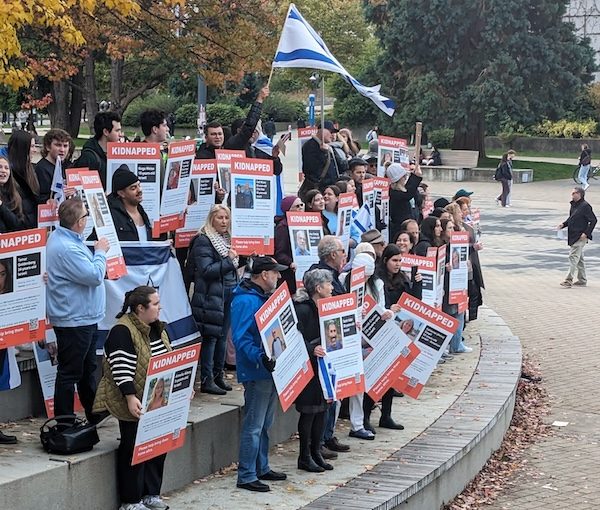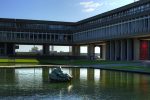On Nov. 1, about 200 Jewish students and their supporters engaged in a low-key demonstration at the University of British Columbia, with many holding posters of kidnapped Israelis. Since the terror attacks of Oct. 7 and the start of the Israel-Hamas war, universities and colleges worldwide have been hotbeds of conflict. (photo by Pat Johnson)
Jewish students and their supporters at the University of British Columbia celebrated a victory last week after the student government overwhelmingly rejected motions that critics say were openly antisemitic.
The Alma Mater Society (AMS), which represents UBC students, voted in the early hours of Feb. 29 not to include a number of referendum questions on the ballot during upcoming student elections.
One proposed question accused Israel of genocide and called for an end to UBC’s exchanges with Israeli institutions. It would have also invited students to vote on whether they believe Hillel BC, the organization that has represented Jewish students, faculty and staff at the university since 1947, should be evicted from campus. (Hillel’s lease is with the university and the AMS has no jurisdiction over whether Hillel does or does not remain on campus.) This question was rejected by a vote of 23 to 2.
A second proposed referendum question would have asked students to massively revamp the governing structure of the AMS, adding dozens of additional elected representatives of marginalized groups. The change would have assigned designated groups representation on student government, including the Social Justice Centre, UBC Solidarity for Palestinian Human Rights, UBC Trans Coalition, Black Student Union, Indigenous students, and the Women’s Centre. Explicitly excluded from representation were Jewish students and groups that represent them. This proposal was rejected 25-0.
Referendum questions can be submitted anonymously, so it is not known from which individuals or groups these proposals emerged, though they had support from the Social Justice Centre, which calls itself “a resource group that works toward progressive social change, inclusivity and equity through a survivor-centric, harm-reduction, radical, feminist, decolonial, anti-oppression framework.”
“I was very pleased and relieved that the AMS leadership chose not to include what I would say are very antisemitic referendum questions on the student voting ballots,” Rob Philipp, executive director of Hillel BC, told the Independent. The intention of the proposed ballot question was to intimidate Jewish students and the vote is a reassurance to Jewish students, he said. “It’s surprising that it took them close to five hours to discuss this. But the vote, in the end, was pretty overwhelming to turn it down, so that was very heartening for us.”
A few hours later, across town at Simon Fraser University, referendum results were announced, with an anti-Israel ballot question receiving overwhelming support. The compendious policy, adopted by the Simon Fraser Student Society in 2022, was put to a vote by the broader student population, endorsing the boycott, divestment and sanctions campaign and repeating the boilerplate condemnations of Zionism as “a colonial ideology” bent on “ethnically cleansing the Indigenous population.”
The referendum question passed 1,801-442 and, while the statement of results did not indicate percentage turnout, there are around 40,000 students at SFU. It appears perhaps one in 20 students voted in the elections, in which a new president was elected with a tally of 878 votes.
These are just two of the foremost fires the Jewish community has been attempting to put out on campuses across the province recently. Universities and colleges worldwide have been hotbeds of conflict since the atrocities of Oct. 7 and the beginning of the war between Israel and Hamas. Administrators have struggled to balance preservation of free speech with often dangerously inflammatory, sometimes clearly antisemitic expressions. The presidents of the University of Pennsylvania and Harvard University were forced to resign after their remarks before a congressional hearing late last year were viewed as insufficiently condemnatory of overt calls for violence against Jews.
Philipp emphasized that postsecondary administrators in British Columbia have all been supportive of the Jewish community’s concerns – the administrations are not where the problems are coming from, although they are inevitably placed in the middle of these dramatic conflicts.
At Langara College, a months-long controversy over the fate of Natalie Knight, an English instructor who called the Oct. 7 mass murder of Israeli civilians “an amazing, brilliant offensive,” may not be over. Knight was put on leave while the college undertook an internal investigation. She returned to work, albeit in a non-instructional role, after the investigation determined her comments were “not clearly outside the bounds of protected expression.” She then spoke at a rally on campus, where she declared: “I’ve been reinstated as an instructor with no disciplinary actions, which means we won. It means we won. It means I did nothing wrong.”
Knight was then fired. While not mentioning her by name, the college said that an employee had engaged “in activities contrary to the expectations laid out by the college and as a result this employee is no longer an employee.” Her union has taken up her case.
Philipp commended Langara’s president, Dr. Paula Burns, for her leadership.
At Emily Carr University of Art and Design, some instructors have encouraged students to leave classes to attend pro-Palestinian rallies, and what Philipp calls “very, very aggressive posters” have appeared on campus. Hillel has been in conversation with administrators there.
“They understand the issue and they are in process right now of making changes to help protect the student body,” said Philipp.
“All our relationships are pretty strong,” he said of administrators at the many institutions at which Hillel BC has a presence, adding that he was recently in Victoria and had dinner with the president of the University of Victoria.
“These administrators,” he said, “are encountering very, very challenging situations that are really stressing their organizations at different levels. Nobody’s able to figure out exactly how to handle these very tricky situations.”
Hillel is also dealing with a lawsuit from the Social Justice Centre, about which they are unable to speak publicly except to say that an independent contractor, not acting on behalf of the organization, participated in the distribution of contentious stickers around the UBC campus. Hillel terminated its relationship with the contractor but is facing a case that attempts to hold the organization responsible.
These are not easy times for Jewish students, but, in some cases, individuals are finding resources they did not know they have.
Rachel Seguin, a graduate of Vancouver Talmud Torah elementary and King David High School and a second-year psychology student at UBC, has become an accidental activist.
“Since Oct. 7, I’ve seen a new part of me that I didn’t even know existed – neither did my parents, honestly,” she said. The anti-Israel actions of the Social Justice Centre and the repeated stonewalling by the AMS in response to her complaints have driven Seguin to become a public voice against antisemitism on campus, including addressing the council last week in opposition to the referendum proposals.
“I didn’t imagine myself doing something like that,” she said. The fact that the AMS did what Seguin believes is the right thing was, she said, “really refreshing and satisfying.”



